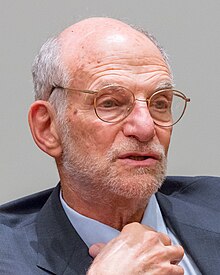Michael Rosbash
American geneticist and chronobiologist
Michael Morris Rosbash (born March 7, 1944) is an American geneticist and chronobiologist of Jewish descent. Rosbash is a professor at Brandeis University[1] and investigator at the Howard Hughes Medical Institute. Rosbash's research group cloned the Drosophila period gene in 1984 and proposed the Transcription Translation Negative Feedback Loop[2] for circadian clocks in 1990.
Michael Rosbash | |
|---|---|
 Michael Rosbash in Nobel Prize press conference in Stockholm, December 2017 | |
| Born | Michael Morris Rosbash March 7, 1944 Kansas City, Missouri, U.S. |
| Nationality | American |
| Alma mater | California Institute of Technology (B.S.) Massachusetts Institute of Technology (MS, PhD) |
| Spouse | Nadja Abovich |
| Awards | Gruber Prize in Neuroscience (2009) Nobel Prize in Physiology or Medicine (2017) |
| Scientific career | |
| Fields | Genetics Chronobiology |
| Institutions | University of Edinburgh Brandeis University Howard Hughes Medical Institute |
| Doctoral advisor | Sheldon Penman |
Along with Michael W. Young and Jeffrey C. Hall, he was awarded the 2017 Nobel Prize in Physiology or Medicine "for their discoveries of molecular mechanisms controlling the circadian rhythm".[3][4]
References
change- ↑ "Life Sciences Faculty – Michael Rosbash". www.bio.brandeis.edu. Archived from the original on 16 October 2018. Retrieved 2 October 2017.
- ↑ "The Drosophila Molecular Clock Model – HHMI's BioInteractive". www.hhmi.org. Archived from the original on 17 February 2013. Retrieved 2 October 2017.
- ↑ Cha, Arlene Eujung (2017-10-02). "Nobel in physiology, medicine awarded to three Americans for discovery of 'clock genes'". Washington Post. Retrieved 2017-10-02.
- ↑ "The 2017 Nobel Prize in Physiology or Medicine – Press Release". The Nobel Foundation. 2017-10-02. Retrieved 2017-10-02.